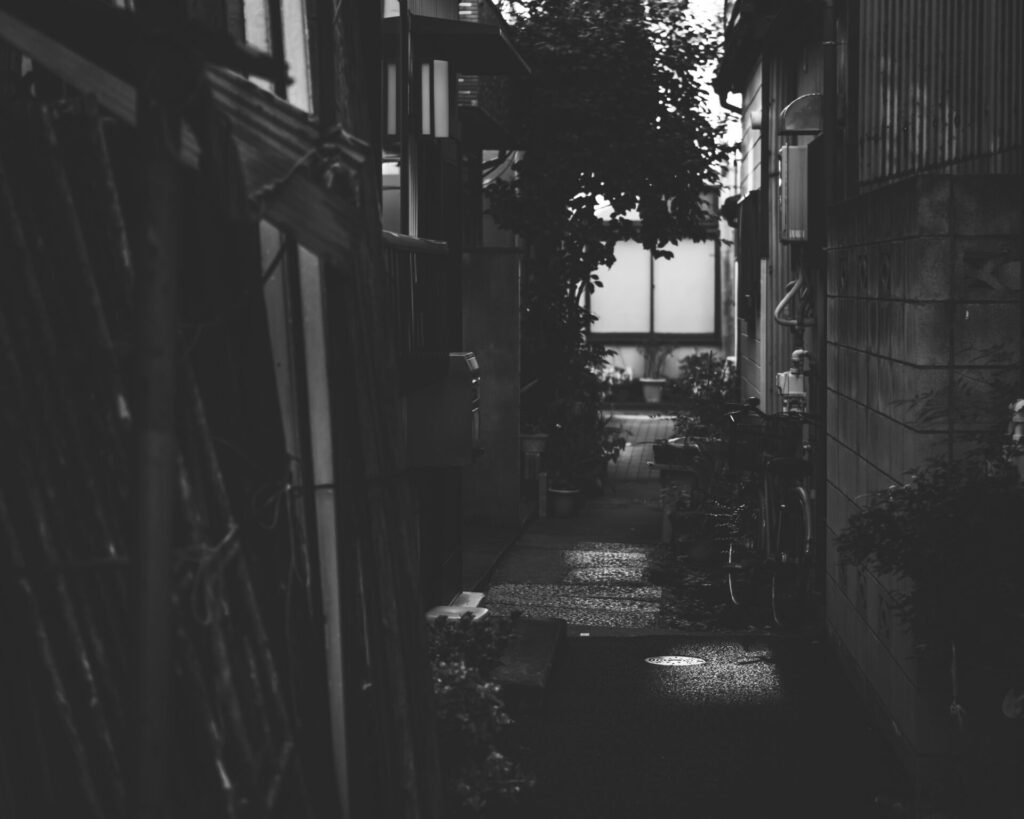2024-12-19
A Place with the Power of Resonation and Attraction. The Interview with Masakazu Shigeta on the Occasion of the First Anniversary of the Idealism Series
The Idealism series, started at the end of 2023, celebrates its first anniversary this November. We have invited twelve guests, from musicians to entrepreneurs, so far. The dialogue developed in all directions from various themes as the starting point is like a new form of guidepost. Taking this first anniversary as an opportunity, we asked Mr. Shigeta, the host and the brand founder of OSAJI, about his thoughts on the Idealism series, reflecting on the past dialogues.

“Even a single concept or word has its gradation, which leads to diversity.”
— The “Idealism” series initially started out as a place to voice and discuss the idealistic thoughts of each individual. But what is its purpose, then? Mr. Shigeta, you have recently been explaining to guests that the purpose is “to explore the essential happiness in this day and age.”
Masakazu Shigeta: What is the purpose of voicing ideals? That is what I have been thinking about, and what came out through the process is the theme “What is happiness?”
Through the dialogue with guests each time, I noticed that, although their genres are different, everybody aims to reach the top of the same mountain, and I think the peak might be “happiness.” As I feel the word “happiness” contains a somewhat suspicious image, I am reluctant to use it casually, but I eventually use it because no word can replace it.
— Even if we simply say “happiness,” there are various forms, aren’t there?
Shigeta: Yes. Since I am the type of person who wants to make things clear, I have always wanted there to be a single clear answer to everything. However, things like “happiness” can not be clearly defined. Now, I feel it might be actually more important “not to make things clear.”
In the most recent dialogue with Mr. Kanaizumi of NewsPicks Studio (vol.12 Part 2), we mentioned the good and bad things brought by “Galapagosization,” which means the isolated development of Japanese products and culture from the rest of the world. I felt the changes of the times in his comments that Galapagosization has a positive side rather than always just negative. Even a single concept and word has its gradation, which leads to diversity. Speaking of how we perceive “happiness,” I have increasingly realized through the dialogues with guests that it is important to understand it in diverse ways, just like a complex combination of colors.
— The word “diversity” reminds us of the dialogue with Mr. Nobuyuki Takeda, a musician and administrative scrivener (vol.8). As the way to provide music has changed to online distribution, it has become easier for anyone to deliver their music. On the other hand, however, there is a situation where even music with no enthusiasm is distributed. Mr. Takeda was very concerned about the situation, describing it as “the diversification of diversity.”
Shigeta: Mr. Takeda’s point was truly eye-opening for me because I had always thought that an environment where music distribution had become common and the spread of free expression was a good thing. However, as Mr. Takeda pointed out, we have a situation where things that don’t seem to be created seriously are distributed. It is doubtful if it is a good thing in terms of cultural maturity. Architect Mr. Okabe also made a similar point (vol.10). Through the dialogue with the two guests, I feel it became clear to me that the increase in ways to communicate does not always help the emergence of creative expression.

— You also actively picked up issues related to money. In the first volume, we had Mr. Takeshi Ohtaka, who works on a crowdfunding platform specializing in the creative field, as the guest. In a recent dialogue, we invited Mr. Hiroto Tsujishita of FUNDINNO, which provides equity crowdfunding (vol.11).
Shigeta: Generally speaking, Japanese people tend to avoid talking about money. But I think there should be more money systems that make people happy, and we should actively discuss how to achieve such systems that allow people to enjoy happiness while respecting individuality. Initiatives in other countries, such as ESG investment, are excellent. But somewhere in mind, I have always had an impression that they are charity in nature. However, according to architect Mr. Okabe, those who make ESG investments also calculate the return on their investment in the long run, and they are sowing the seeds so that their grandchildren and great-grandchildren will reap the benefits. Hearing that, I felt it essential to make long-sighted investments to avoid species extinction.
When you see a company as a life form, whether or not it survives 10 years from now will depend entirely on the management’s stance towards investment. Investments in past achievements show the result quickly, so employees can safely say with pride that it has meaning. But it alone will not guarantee the business for 10 years from now. The important thing is the combination and mutual understanding of those who value future-oriented investments and those who invest to solve the issues at hand. Both will only be meaningful if you can do it together.
— The topic of future and past investments seems to be connected with the philosophical and economic happiness we discussed with Mr. Kanaizumi. If we only focus on happiness in the philosophical sense, the discussion can end up with nothing but a mere ideal. By paying attention to both ideals and reality, we can make the discussion on “the future we want to achieve” more rousing.
Shigeta: Just as the brain works with the combination of its right and left hemispheres, I think people must feel on each key occasion that they can not survive without each other. So, there is a certain meaning in the fact that opposite ideas and opinions exist. There is no need to force agreement, but there should always be room for cooperation at any time to prevent both sides from collapsing. However, it isn’t easy to take it into practice in the real world, which I always keenly feel at the company every day.

“The Idealism series has the power of resonation and attraction.”
— Have you ever received feedback from staff members regarding the contents of Idealism?
Shigeta: Not very often, but yes. I am involved in promoting a cosmetic therapy called “blind makeup,” where people can enjoy makeup even if they have lost their sight, and making music by collaborating with unknown artists. Some staff think, seeing my activities, “Oh, I didn’t know that we can do things like that in our company.” I think those who have that kind of feeling read the article. Although they might find it challenging to propose business-related things directly to me, they can casually tell me their ideas about the article content. I think it is important we have an environment like that.
— Mr. Kohei Kamiya, a high school student at the time of the dialogue, now works at your company as an intern (vol.4). Did working with a young person in his teens give you new insight?
Shigeta: At first, I assigned him to a job where I thought he could use the career he obtained through the project of accumulating school regulations across Japan. But after a while, I came to think that it was not the best thing I could do for him. When he was a high school student, he found unreasonableness in school rules and fought very hard to make a breakthrough. However, once you enter society, you will find it difficult to find time for what you think you should be essentially working on and earn money by it at the same time. At a stage where you do not have immunity against the unreasonableness of society, you can not expect good results from doing this and that. I didn’t think it was good for his future to learn something in a situation like that, either. So, I have asked him to handle requests coming in from various departments.

— It has become customary for you to share the content of books you have recently read. Would you tell us how you secure the time to read books during your busy schedule and on what standard you choose them?
Shigeta: I have the period of input and output, and my body refuses to read books when I am in the period of output. On the other hand, I read several books during the input period. But I am not a speed reader, and as I think of various things while reading, I can read at the most four to five books a month. Regarding the selection, sometimes I follow Amazon’s “recommendations,” but I find books that bring a significant paradigm shift to me more often in bookstores. The books I am currently interested in are those about proteins and the nervous system with graphical explanations. I want to learn more about the human body, and I am interested in content that plainly explains the relationship between physical and mental conditions and beauty from a scientific point of view.
— You have already mentioned several guests. Would you tell us more about the guests that impressed you?
Shigeta: Even now, I think the dialogue with Mr. Eiichi Izumi, the owner of the select shop DESPERADO, was truly impressive (vol.2). Actually, I used to work in the apparel retailing business in Nitto Denka Kogyo.
— That is a new fact.
Shigeta: The person in charge of purchasing at the time was a fan of the apparel brand SPOLOGUM, and I got a connection with designer Mr. Atushi Nonaka through buying accessories such as clothes and stoles.
When we came up with an idea to add a SPOLGUM-designed porch to a Christmas gift box of OSAJI this year, I contacted Mr. Nonaka for the first time in about ten years. As soon as we started talking, he said, “The dialogue with Mr. Izumi was excellent!” It made me realize that creativity and thoughts connect with each other. This year, I had many opportunities to meet old friends and former colleagues for the first time in more than a decade. I was glad to hear that everyone I met told me they read Idealism. I have realized once again that Idealism has the power to resonate and attract people.

“It is not that cool adults do things because they want to be approved by others.”
— In the dialogue with Mr. Izumi, the story you shared about your daughter was also impressive. From then on, you started to mention your daughter and son more often. I think you must have a good relationship with them, and I always find it interesting to hear the stories.
Shigeta: I am not sure if we get along well. Especially my daughter is a handful. She is already in the third year of junior high school, so I don’t simply say she is lovely as I used to do when she was small, but she always gives me new insight. Just recently, I was told that she would participate in a beauty contest. The contest started accepting entries this January, and she had already advanced to the semi-finals when she told me about it. When I asked her why she participated, she said it was because she “wanted to be recognized.” She has always said she wants to become a makeup artist to make people all over the world smile. It seems she thought that in order to achieve it, it was necessary to be recognized.
— Is it a kind of “desire for approval” which is common in younger generations?
Shiegta: I think it is a little different. Regarding the topic of “desire for approval” among young people, we also discussed it during the dialogue with Usa-beni (vol.9). She said that the reason she works in parallel as an idol and artist is not for the “desire for approval,” but the “desire for expression.” During the dialogue, I suspected that it is actually the desire for approval that young people seek. However, facing my daughter about the beauty contest made me understand what Usa-beni was saying. In my daughter’s case, she doesn’t have a desire to be recognized by others that much, but it is not that she has no interest in it. However, more than that, she was determined to achieve her ultimate goal of making people smile, and she thought it was necessary to raise recognition through the beauty contest to achieve it.
— Isn’t it similar to you who produce cosmetics to make people smile?
Shigeta: My daughter always says, “Dad, I’m glad you enjoy working.” So, I have always thought she would live a life like me. But when I listened to what she said during the session of the beauty contest held online, I thought she was different from me. I was not good at working hard, so I often quit things in the middle, like the career of a recording engineer and the shop I had in Takasaki. There was nothing I started with intention, and all my actions resulted from the fact that I was forced into situations where I had no choice but to do them. But my daughter is different. She clearly told the audience that “I could not do what others could, and I could not continue working hard at anything. The reason why I participated in the contest is that, by facing myself like that, I wanted to somehow become a person who can continue to strive.” Hearing that, I decided to get away from the “desire for approval” and felt I received courage. In fact, it is not that cool adults do things because they want to be approved by others. That is something I strongly feel through dialogue with guests as well.

“The world around us is not that simple. Is it really happy and abundant to live only with things that can be explained?”
— It seems there are some cases where a dialogue has led to a collaboration. In the dialogue with musician and poet Mr. Madoki Yamasaki (vol.3), I remember you asked him to collaborate to create “Beauty by Listening.”
Shigeta: The collaboration with Mr. Yamasaki was successfully released just last month. In addition, I asked Mr. Akihiro Miyatake, the Executive Vice President of hankyu hanshin marketing solutions Inc. (vol.7), to help me set up a personnel evaluation system for our company. He is the image of a mature adult I want to be.
Until recently, I have thought that there is no need for a so-called personnel evaluation system in our company. One of the reasons is that the scale of the business was not so large that we could do without it. However, as the number of staff members increased, I often came to feel the need for it on various occasions. Although everybody is doing what they think is good for the company, things are so different that it sometimes causes negative effects or a conflict between the majority and minority. I want to resolve that kind of imbalance by introducing the personnel evaluation system.
— Is it like establishing a vision and mission and incorporating actions and initiatives to achieve them in the evaluation system?
Shigeta: I think the visions, missions, and action guidelines are quite vague. After thinking about what the personnel evaluation system should be like, the answer I came up with was “the education system of the company.” At the end of the dialogue with Mr. Kanaizumi, based on the idea, I said, “The education system is going to be important, and for society, the company is like Terakoya, the temple schools of the Edo era.” I think Terakoya‘s education curriculum can be the personnel evaluation system. Since it is a system, we set a certain standard, but the idea of respecting individuality and valuing independence and motivation remains the same. I want to introduce the curriculum that will help you show more individuality and keep your motivation higher as you complete the items on the system.
— So, are you going to make it together with your staff members?
Shigeta: Ultimately, one of the ideal forms is what Mr. Miyatake calls “the system with employee participation,” but there are things that I need to tell and teach before I ask everybody to think together. At this stage, I think I will play the central role in making it. Once the system has been well understood and the benefits have become apparent, there should be a phase where everybody participates in improving it.
— Although you don’t give too much advice to employees, the only thing you always tell your staff is to “be attentive.” What is the level of awareness among members, including those who newly joined?
Shigeta: The other day, OSAJI held an on-site media presentation for the first time in a while. At the event, staff members from various departments attended guests from the media. Watching them look after the guests, I know it sounds like a self-praise, but I thought my staff were really attentive. The way they welcomed guests, guided them to their seats, engaged in small talk with them, and handled luggage were all excellent. In my experience, at events like that, it is normal for us to have a couple of accidents. Even if nothing seemed to happen at the time, I often received complaints after the event. But this time, I received none of that. There was really no complaint, and I even started to worry. At the same time, I thought it would be a problem if I could not properly evaluate staff members who can provide such excellent services. That is another reason why I felt the necessity of the system.

— When I edit the article, I sometimes want to know the intention of your remarks in a little more depth. One example is when you said you feel “the quantum thinking in the music of Mr. Yamasaki.” (vol.3)
Shigeta: For me, the main character of philosophy is “human,” while that of the quantum is “nature.” It is important to think about how to have contact with nature, which humans can not fully control, and the image of quantum thinking in my mind is something that shows strong ideas and creativity in the process.
— By “contact,” do you mean how to understand the behavior of nature?
Shigeta: What I mean is closer to the nuance of accepting things that logic cannot explain as a sort of blessing. The other day, I met the president of Yamane Sake Brewery, which is located in Shimane prefecture. He said he changed the mother water because he wanted to make more “alluring sake,” and for that purpose, he dug a well behind the brewery. In sake brewing, it is traditionally considered taboo to change the mother water, and conventional wisdom says changing the water does not have almost any effect on its taste. But he couldn’t achieve his ideal sake by changing rice and malt, so he decided to do everything he could do. And it turned out that he could make his ideal sake as a result. What I related to this story is that, after all, what we understand by science is limited, and there are far more things we have not understood. Generally speaking, phenomena that you can explain are science, and if you can not, it is not science, but the world around us is not that simple. I have always wondered if living with things that you can explain is really abundant and happy. Because there are more things in the world that you can not explain, aren’t there? I think having quantum thinking also allows you to accept something unexplainable rather than reject it.

“A sense of ethics ought to be cultivated by pursuing the question of what abundance means to human beings.”
— We are entering the 2nd year of the Idealism series. Do you have any themes that you want to discuss?
Shigeta: One of the themes I am interested in is “ethics.” When you approach manufacturing, you should have a high level of ethics, but I feel the awareness and thoughts toward ethics are entering a dangerous zone now. The issues of ethics have something to do with issues such as regenerative medicine, which can lead to immortality; generative AI, which can far surpass human intelligence if it goes in the wrong direction; and quantum computing, which has overwhelming capabilities to process information.
A sense of ethics ought to be cultivated by pursuing the question of what abundance means to human beings. Since there is no absolute criterion for the definition of abundance, combining them into a single idea is difficult. However, it unquestionably leads to bad situations if people involved in manufacturing stop facing ethical issues. It is often said that Steve Jobs’ approach is product-oriented, but for me, he was in dialogue with an ethical perspective on what abundance means. That is why he also faced Buddhism and others. If you ask me if I can do it now, I am not sure. But I want to reach a state like Steve Jobs one day, and I feel like I am on the journey for it now.
— Before the series started, you mentioned some people you want to invite, and there are still many of them who we haven’t. For example, Mr. Jinsuke Mizuno of “Tokyo Curry Bancho,” a traveling cooking group, is one of them.
Shigeta: Mr. Mizuno’s activities are really interesting, aren’t they? Have you heard of his recent book, “System Curry Studies?” That is really something. The blurb on the cover says, “Recipes are no longer necessary.” I feel it is like a height of work.
I know about it because I once published a recipe book. Even if you follow the recipe and cook well, you think somewhere in your mind, “I could cook well, but…” I don’t want readers just to learn how to cook but feel the creative aspect of cooking. It might sound rude to Mr. Mizuno, but when I read his book, I thought he had the same idea as me, and I was really envious of his ability to express it.
Mr. Shohei Uno, who runs a craft shop called SML in Nakameguro, is another person I want to invite. Mr. Uno and I critiqued and reviewed things occasionally, and I like his simple approach to thinking. He is already at a height in the field of craft, but I feel he will keep changing to aim for even greater heights.
— What are your thoughts on yourself by looking back at 2024?
Shigeta: This year, I keenly felt the immaturity of myself. I have often wondered why I make such choices or hesitate in certain situations. I think I had many situations like that in business, parenting, and social interactions. In particular, I became keenly aware of my immaturity during the dialogue with Mr. Takeda. Until then, I had always kept saying that diversity was good, so when he said if diversity gets too diversified, it puts culture in danger, I felt his opinion turned my way of thinking on its head. But I was lucky to have such an opportunity to know it.
Younger people these days have a mature outlook on life, don’t they? I am 46 years old, but I think having a mature outlook on life at this age is not good. I have to fail more and get devastated more. I want to be active for the rest of my life like jazz musician Mr. Sadao Watanabe, who continues to, with a certain level of mature outlook on life, have a desire to make better music even after 90. That is the ideal way to age for me.
— Lastly, would you please share again what Idealism means to you, Mr. Shigeta? At first, we thought it would be a place where we could express ideas, but from the dialogue style format, it is closer to “a place of dialogue” rather than “a place of discussion.”
Shigeta: Simply put, it is a device that attracts people. When I started the project of Idealism, I set the Davos conference, which is held every January in Swiss, as one of the goals. I have always thought we can bring change by having people with different ideas come together and form groups. I think Idealism is the device that makes people gather in a positive sense. The point of the content is that readers can obtain deep insight into the interests and thoughts of guests. At the same time, I want readers to enjoy how my ideas change. You can find how my ideas have changed by reading the articles from Vol. 1 to the latest one. Touching the thoughts of others will help you improve your thoughts and their accuracy. That is what human beings should be like. Touching somebody’s ideas, being influenced, and changing. I would be happy if readers found it comfortable.

Profile
-
-
Masakazu Shigeta
After working as an engineer in the music industry, Shigeta began his career as a cosmetics developer in 2001. From 2004, he worked on various cosmetics brands in the healthcare business of Nitto Denka Kogyo Co., Ltd., a metal surface treatment company founded by his great-grandfather. In 2017, he founded “OSAJI,” a skincare lifestyle brand, and became its brand director. In 2021, as a new store of “OSAJI,” he produced “kako,” a specialized shop for home fragrances and perfume in Kuramae, Tokyo. In the following year, he opened a combined shop of “OSAJI,” “kako,” and a restaurant, “enso,” in Kamakura, Kanagawa. In 2023, utilizing the technical skill of Nitto Denka Kogyo, he launched a pottery brand, “HEGE,” and in October of the same year, he became CEO of OSAJI Inc. He also has published books on beauty and held cooking classes and events focusing on food, which is the origin of beauty. He released a collaborative album with F.I.B JOURNAL called “Gensho hyphenated” in November 2024 and has been expanding the range of activities.
Publications
Taberu Biyou (Eating for Beauty) (SHUFU TO SEIKATSU SHA, 2024)
42-Sai ni Nattara Yameru Biyou, Hajimeru Biyou (Beauty cares to quit and start when you turn 42) (Takarajimasha, 2022)
-
Interview & Text:Masahiro Kamijo
-
Photographs:Eisuke Komatsubara
